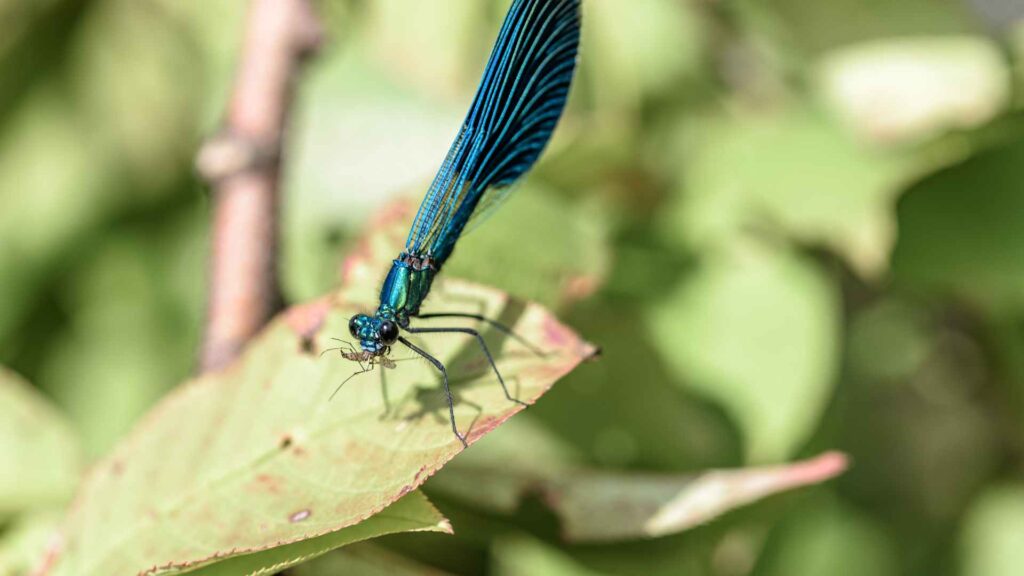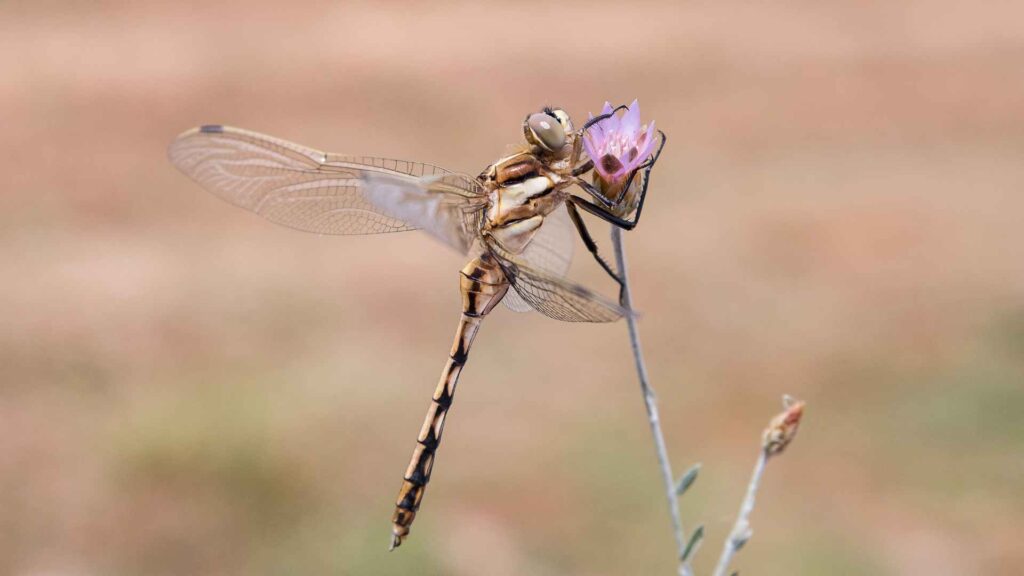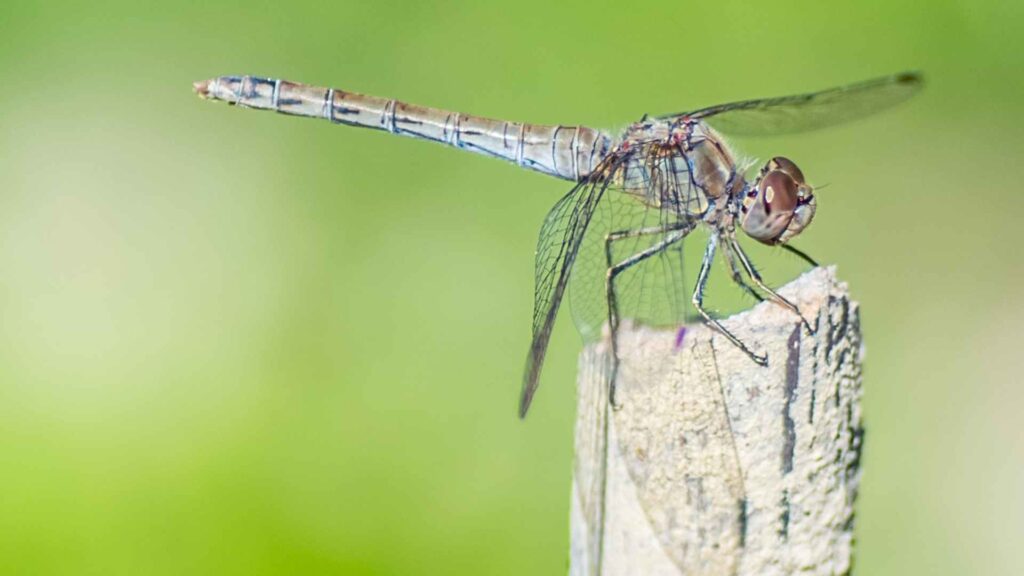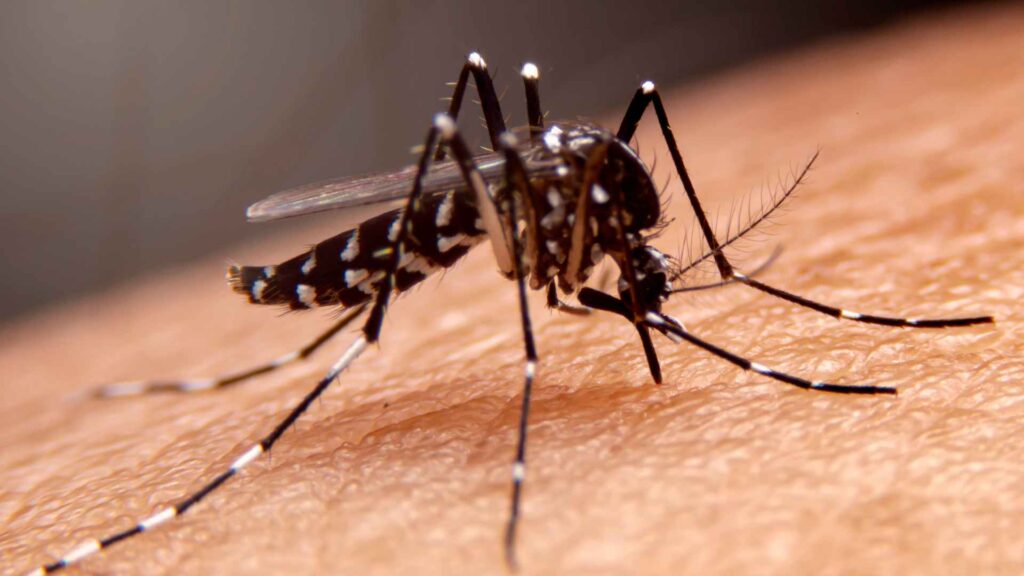Table Of Content
ToggleDragonflies are not just beautiful, iridescent insects that grace our gardens and ponds; they are also voracious predators with a particular appetite for mosquitoes. Known for their agile flight and keen vision, dragonflies play a crucial role in controlling mosquito populations, making them a natural ally in the fight against mosquito-borne diseases.
This article delves into the relationship between dragonflies and mosquitoes, exploring how these aerial hunters capture and consume their prey, the benefits they bring to ecosystems and humans, and how we can encourage their presence in our environments.
Dragonflies are incredible flying predators with shimmering wings and elongated bodies. They’re often mistaken for damselflies, but dragonflies are larger with wider bodies and their wings stay spread out even when they’re resting.
Dragonflies are found near freshwater sources like ponds, lakes, and wetlands. They’re agile flyers with exceptional eyesight, making them efficient hunters.
Dragonflies are carnivores with a hearty appetite for small flying insects. Their diet primarily consists of:
Dragonflies are opportunistic feeders and will target any insect that fits their size range. However, mosquitoes are a favorite due to their abundance and ease of capture.
Dragonflies are aerial hunters with impressive eyesight. Their large, compound eyes provide a nearly 360-degree view, allowing them to spot prey from afar. Their maneuverable wings enable them to change direction quickly, making them masters of the aerial chase.
Tailor your pest management strategy. Start now.

There’s no doubt about it – dragonflies eat mosquitoes Here’s why:
Studies have documented dragonflies actively preying on mosquitoes in both their adult and larval stages (known as nymphs). Nymphs, which live in water, are particularly effective at controlling mosquito larvae before they become adults.
Frequency of Mosquitoes in Their Diet: Research suggests that dragonflies can consume hundreds of mosquitoes per day! This makes them a valuable natural defense mechanism against these bothersome pests.
There are two main reasons why dragonflies target mosquitoes:
Dragonflies are relentless hunters with a well-honed skillset:
Stages of Mosquito Predation: Here’s how a dragonfly takes down a mosquito:
Choose the best pest control frequency. Get expert guidance.

The presence of dragonflies goes far beyond simply adding a touch of beauty to your backyard. Here’s how their mosquito-eating habits benefit us:
Dragonflies play a crucial role in maintaining a healthy ecosystem by keeping mosquito populations in check. This helps to:
Having dragonflies around offers a two-fold advantage:
Dragonflies offer a safe and eco-friendly solution to the ever-present problem of mosquito bites. Unlike chemical pesticides, which can harm beneficial insects and pollute the environment, dragonflies provide a natural and sustainable form of pest control.
With dragonflies patrolling your yard, you can enjoy spending time outdoors without the constant annoyance of swatting and itching.
Here’s where the benefits for humans truly take flight:
Ready to fumigate your home? Contact us today for a customized quote!

Dragonflies are more than just dazzling aerial acrobats; they’re nature’s built-in mosquito control system! By creating a dragonfly-friendly environment in your yard, you can attract these beneficial insects and enjoy a significant reduction in those pesky biters. Here’s how to turn your backyard into a dragonfly paradise:
1. Provide a Water Source: Dragonflies need water for breeding and their aquatic nymph stage to thrive. A small pond, fountain, or even a birdbath can be enough to attract them. Keep the water source clean and free of debris to ensure healthy dragonfly development.
2. Plant Suitable Vegetation: Dragonflies love to perch on plants while they survey their territory. Choose native plants that provide resting spots and attract other insects that dragonflies prey on. Here are some dragonfly favorites:
3. Create a Habitat-Friendly Environment: Dragonflies prefer areas with some sun exposure and protection from strong winds. Consider leaving a small section of your yard with tall grasses and native wildflowers to create a natural haven for these beneficial insects.
4. Avoid Pesticides: Chemical insecticides can harm not only mosquitoes but also dragonflies and other beneficial insects. Opt for natural mosquito control methods or targeted solutions that won’t harm dragonfly populations.
5. Be Patient: Creating a thriving dragonfly haven takes time. By consistently providing the elements they need, you’ll gradually see an increase in dragonfly activity in your yard.
Bonus Tip: Observe your local watering holes and parks to see what types of plants attract dragonflies in your area. This can give you valuable insight into the best plants to choose for your own yard.

Dragonflies are fantastic natural predators, but they’re not the only option for biological mosquito control. Here are some additional methods to consider:
It’s important to note that each method has its own advantages and limitations. Consider factors like the size of the area you’re treating, the presence of other wildlife, and the specific mosquito species you’re targeting when choosing a biological control method.
Secure your home with the right pest control plan. Find out how.
As a pest control expert, I’m thrilled to highlight the importance of dragonflies in our fight against mosquitoes. These magnificent creatures are nature’s answer to pesky biters, consuming hundreds a day!
Their presence effectively controls mosquito populations, reducing the risk of mosquito-borne diseases. Dragonflies are not just beautiful additions to our backyards, but also beneficial insects that enhance our outdoor experiences.
By creating dragonfly-friendly environments through suitable plants and water sources, and supporting conservation efforts, we can unlock their natural pest control abilities while promoting a healthy ecosystem.
So next time you see a dragonfly flitting about, remember – it’s a valuable ally, not just a pretty sight!
You can attract dragonflies to eat mosquitoes by providing a water source and planting suitable vegetation. Dragonflies thrive near freshwater sources like ponds, lakes, and wetlands, so adding a pond or water feature to your yard can encourage their presence. Additionally, planting native plants such as cattails, water lilies, and rushes provides perching spots and attracts other insects that dragonflies feed on, further supporting their habitat.
Dragonflies are highly effective at killing mosquitoes due to their predatory nature and agile hunting skills. These insects consume large quantities of mosquitoes daily, both in their adult and larval stages, making them valuable allies in controlling mosquito populations and reducing the spread of mosquito-borne diseases.
A single dragonfly can eat hundreds of mosquitoes each day. This voracious appetite makes them one of the most efficient natural predators of mosquitoes, contributing significantly to mosquito population control in their habitats.
Dragonflies do kill house flies, as they are opportunistic feeders that prey on a variety of small flying insects. In addition to mosquitoes, their diet includes midges, gnats, flies, and mayflies, showcasing their role in maintaining ecological balance by controlling various insect populations.
Your trusted pest control experts in Southern California. Keeping your neighborhood pest-free!